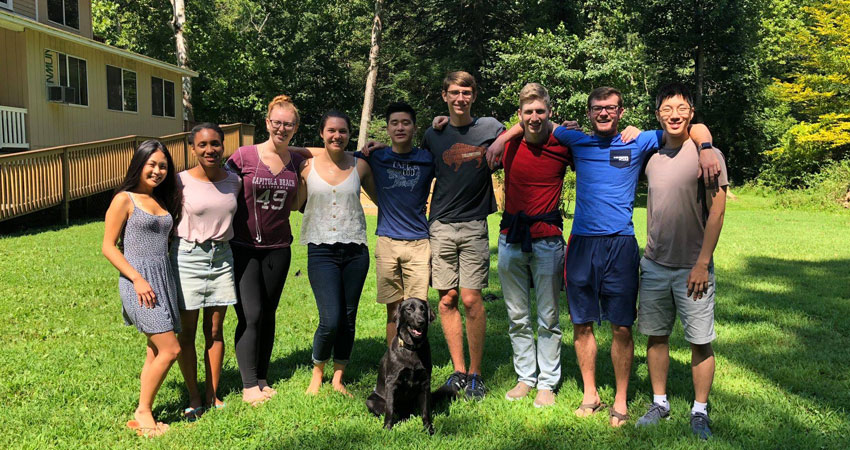Wednesday, August 29, 2018
Witnessing in Exile
“Then the king ordered Ashpenaz, chief of his court officials, to bring into the king’s service some of the Israelites from the royal family and the nobility— young men without any physical defect, handsome, showing aptitude for every kind of learning, well informed, quick to understand, and qualified to serve in the king’s palace. He was to teach them the language and literature of the Babylonians. The king assigned them a daily amount of food and wine from the king’s table. They were to be trained for three years, and after that they were to enter the king’s service.”
Daniel 1:3-5 (ESV)
In many ways, we Western Christians living in a post-Christian context, can relate to Daniel and company, who found themselves in exile following King Nebuchadnezzar’s hostile takeover of Jerusalem. Like Israel’s life in exile, the world around us is shifting ever so quickly; often times we’re left feeling a bit dizzy as we wonder how we should live in a culture that is so different from us—a culture and society that has different values, hopes and dreams from our own. So how should we live? How should we engage with the cultural context in which we find ourselves?
I think Daniel can help us here. After Nebuchadnezzar begins his campaign of relocating some of the Israelites to Babylon, he directs the chief of his court officials to put into the king’s service select young men of Israel’s royal family and nobility (v. 3). They were to be trained in everything Babylonian, including the language and literature, after which they would serve the king. Notice that, although there are plenty of instances where Daniel and his friends refuse to partake in certain cultural practices in order to remain faithful to God (v. 8), there is no indication that Daniel resists this training and call to serve the earthly king. In fact, as the story moves along, we find Daniel and company moving up in the ranks of Nebuchadnezzar’s court because they, empowered and emboldened by God, serve the king with love, wisdom, faithfulness and power. They find a way to live within the Babylonian Empire in such a way as to not cave and assimilate to the culture and religion of the Empire, but to be so invested and present—to be so winsomely countercultural under the guidance of God—as to effectively witness to the one and only true King, the God Most High. They do this so well that by Daniel chapter 4, we find out that even King Nebuchadnezzar—that violent, narcissistic tyrant—has come to recognize Daniel and crews’ God as the one and only Most High God.
We should and must follow in the footsteps of Daniel in the context in which we currently find ourselves as God’s people. There are certain practices we must resist, certain beliefs and societal doctrines we must refuse to believe, worldviews that we mustn’t ever take for ourselves. But there are plenty of other ways, as people of God’s kingdom living in this exile of Western culture, we must wisely and courageously invest our gifts, skills and talents to bring about transformation and redemption in the name of Jesus Christ by the power of the Holy Spirit.
An example of how and where we can do this is the media. Think about the influence the media in America has on the lives and worldviews of her people. Think about how the media has the power to influence political campaigns, normalize certain beliefs and ethics within our society and draw our attention to particular stories and issues by controlling the news cycle. If we keep Daniel in mind, our response to this opportunity to witness and influence is to involve ourselves within this industry, and to do so with love, wisdom, faithfulness and power—the same qualities we see in the lives of Daniel and, ultimately, Jesus. Let us sacrificially train for and enter into all the various roles of the media – from reporters to producers to bloggers to executives. Once there, let us live our lives and execute our vocations with such Spirit-infused faithfulness and vibrancy—with a kingdom-ethic that is at once peculiar and winsome—that the people we work with can’t help but wonder what’s so different about us and the people who consume our work can’t help but be influenced by a Gospel-shaped set of values, even if only bit by bit. The media has a disproportionate power to influence the culture compared to other sectors of society, so we, like Daniel, must enter that space with God’s power and wisdom to disproportionately influence a culture for the Kingdom of God.
Most High God, give us love, wisdom, faithfulness and power as we navigate this life of exile in a foreign land, entrusting us with positions of influence, especially within the media, so that we might witness to the true King of this world, Jesus Christ, by the power of the Holy Spirit, for the renown of your Name. Amen.
Justin Doyle
Ministry Fellow, Christian Union at Brown
Selected Resources to Explore for a Cultural Revolution in Media
BOOK (192 pages): Communicating for Life: Christian Stewardship in Community and Media by Quentin Schultze
This book offers a holistic Christian view of communication, showing the vast array of implications for using this gift to responsibly work toward peace and justice.
AUDIO (1:20:14): Media And Journalism
This vocational panel was recorded at the Christian Union Nexus Conference 2016.Nexus is an annual conference that equips students and professionals to seek God and to live out their faith and change culture. The panelists were Lela Gilbert, author or co-author of more than sixty books, Christina Crook, author of The Joy of Missing Out: Finding Balance in a Wired World, and Don Gates, founder of The Gates Group, a literary agency working with pastors and ministry leaders across the country on a variety of literary and ministry endeavors.
BOOK (264 pages): Faith in the Spotlight by Megan Alexander
Megan Alexander is a national correspondent for Inside Edition and a special correspondent for Thursday Night Football on CBS. In Faith in the Spotlight she shares her practical advice for achieving excellence in career, faith, and family and gives us an honest look at thriving in a secular industry as a believer.
Final Prayer Call
This Sunday, September 2, to conclude and celebrate the 21 day fast, we will host a live video-conference prayer call for the 21 day fast, lasting 30 minutes. Starting at 9pm Eastern/8pm Central/7pm Mountain/6pm Pacific, you can view the prayer meeting streamed at dayandnight.org and participate by watching, praying along, and commenting.
Learn More
Click here to join the 21 day fast or to learn more about Christian Union Day and Night.



